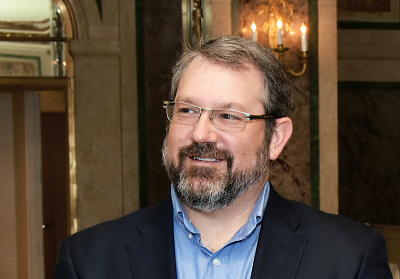Joshua A. Gordon, M.D., Ph.D., says his first priority as director of the National Institute of Mental Health (NIMH) is to listen and learn.
“I intend to spend the first six months to a year learning everything that is happening at the institute and how the research community and psychiatry can work together,” he told Psychiatric News.
Gordon’s appointment was announced by the National Institutes of Health on July 28, and he was expected to assume the new post by the time this issue went to press. He replaces Bruce Cuthbert, Ph.D., who served as acting director after the departure of Thomas Insel, M.D., who was director from 2002 to 2015.
“I am personally delighted with Dr. Gordon’s appointment as director of NIMH,” APA President Maria A. Oquendo, M.D., a professor of psychiatry and vice chair for education at Columbia University Medical Center, told Psychiatric News. “Having worked closely with him over the years, I can attest to the fact that in addition to being a scientist of the highest caliber, he has an open-mindedness, fairness, and thoughtfulness that are rare indeed. I look forward to seeing the wonderful things Dr. Gordon will do. For our part, APA will continue to pursue staunch advocacy for mental health research funding, the most effective path toward improving the lives of our patients.”
Gordon joins NIMH with an extensive research background that focuses on the analysis of neural activity in genetic mouse models that have genetic mutations of relevance to psychiatric diseases such as schizophrenia, anxiety disorders, and depression. His research involves an integrative neuroscience perspective and is performed across multiple levels of analysis, with the aim of understanding how a given disease mutation leads to a particular behavior.
His work has been recognized by several prestigious awards, including the Brain and Behavior Research Foundation–NARSAD Young Investigator Award, Rising Star Award from the International Mental Health Research Organization, A.E. Bennett Research Award from the Society of Biological Psychiatry, and the Daniel H. Efron Research Award from the American College of Neuropsychopharmacology.
In talking with Psychiatric News, Gordon emphasized the need to connect research to the real world of clinical practice and patients’ lives. “I enjoy working with patients,” he said. “I’ve had a clinical practice in addition to my research activities since residency because that’s what keeps you connected to the people that research is supposed to serve.”
Gordon’s predecessor presided over a period of enormous change and advancement in brain and behavior research generally and at NIMH. Among the most important initiatives begun under Insel is the development of Research Domain Criteria (RDoC), designed to reconceptualize diagnosis of mental illness according to “domains” of brain function defined by genetics and neurobiology.
At the time of Insel’s departure in 2015, the former NIMH director said he saw no conflict between DSM and RDoC. “RDoC is a guide to rethinking the way we do diagnosis and may inform DSM-6 or -7, but for now clinicians should be using the DSM and ICD,” Insel told Psychiatric News. “At this point, there is very little in genetics or neuroscience that can give us something better. RDoC is a pathway to get there, but it is not a product that can be used in the near term.”
Gordon agreed. “I think RDoC is still in its childhood; it’s still in the process of developing a framework for understanding the neurobiology of mental illness. It’s not clear yet what it will produce and how it will complement DSM. Will the two in time be integrated? Or will RDoC reveal new diagnostic categories? I think we need to know more, and I look forward to helping develop the tools to evaluate just how helpful RDoC will be.”
Gordon said he believes APA and NIMH share a common mission—to improve treatment of mental illness for all Americans. “Advocacy is the special role that APA has long played, and I know will continue to play,” Gordon said.
He added that he hopes APA and its members will encourage patients to participate in NIMH-funded clinical research.
The theme at this year’s IPS: The Mental Health Services Conference, and of Oquendo’s presidential year, is “Implementing Prevention Across Psychiatric Practice.”
Will prevention have a place in NIMH priorities?
“Absolutely,” Gordon said. But he added that the promise of prevention is still to be realized. In schizophrenia, for instance, he noted that although research groups in the United States and other countries have been able to find cohorts of people at high risk for schizophrenia, it is still uncertain how many of those will in fact have true psychosis.
For now and the foreseeable future, Gordon said he’s on the learning curve. “I hope APA members will be patient with me and that we can work together to further the priorities that APA shares with the institute and improve the treatment of people with mental illness.” ■

